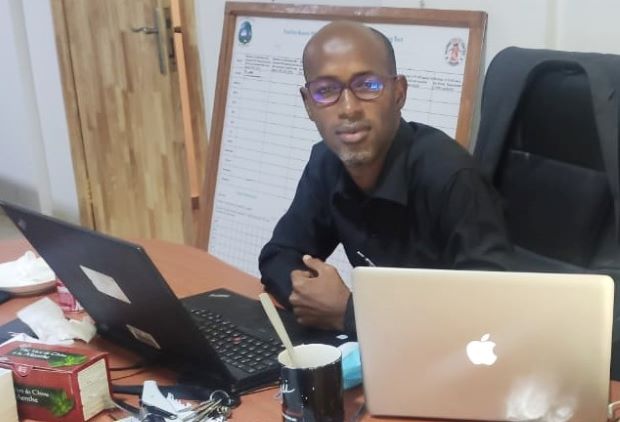Monrovia, Liberia- Entrepreneurship is the lifeblood of most Liberians, many of them operating one business or another.
It is commonplace to find children helping their parents in various businesses when they finish their daily school shift. (Most schools run on two shifts, a morning shift, and an afternoon shift in order to allow more children to attend school.) By 15 years of age, many children are engaged in income generating activities to augment family incomes.
But for Maweyata Sow, 35, the story was different. His father, a businessman, forbade him from hanging out in the market pushing him to pursue education instead.
“My dad likes education and banned me from hanging out in the market. He wanted me to go where he had never been; he wanted me to make the most of education,” said Maweyata.

After completing his primary schooling, his family was forced to flee the war to neighboring Guinea in 2003. While there he was able to join and complete high school at the then Conakry Refugee School, with support from the UN Refugee Agency (UNHCR) and the International Rescue Committee (IRC).
Upon return to Liberia in 2008, he took to his passion repairing computers and other IT equipment. But rather than have him peddling his skills and other wares, his father sent him to college to study computer hardware and networking, and software engineering. These diploma certificates enabled him to land jobs with various companies in Togo and Guinea in the money transfer sector. He also managed a travel agency and a driving school in Conakry, Guinea.
Dissatisfied with this outcome, his father summoned him back to Liberia in 2012 to continue studying, enrolling him for a B.Sc. Information Technology in 2015. While his father had envisioned that he would become a doctor, Maweyata dreamed of becoming an accountant before finding his true north.
“I came to realize that I liked electronics from the beginning. I remember visiting my aunt as a child and driven by curiosity, I opened her television set in a bid to understand how it worked,” he said.
Since graduating from university, he has worked on various assignments involving management of data, creating databases and digital systems for various organizations in
the development sector. His desire to work in development stemmed from interacting and teaching staff of the UN Mission in Liberia (UNMIL) how to use computers.
“I really liked their contribution to humanity, but I was just a computer guy who did not know much about development. However, I have an inbuilt tendency to learn new things, therefore, I have been able to help Liberia, Nigeria, Burkina Faso, and DRC develop health information databases and management systems,” he said.
Maweyata is the brains behind the digitalization of the Liberian Police Crime Management Information System and the Judiciary Case Management Information System, which are expected to improve security and access to justice in the country. The digitalization of the Police, the Judiciary and the Ministry of Justice are supported by UNDP.
The crime system allows the police to update and track in real time crimes committed and appropriately deploy officers to promptly investigate. The court system enables court clerks in the whole country to promptly log cases and track their progress, enabling members of the public to know exactly at what stage their matters are.
“In both cases, I worked with the officials to understand their needs, then developed a custom-made information management system for each using existing open-source technologies,” he said.
Maweyata says the systems are one of a kind in Africa with scope for expansion to include more categories of information e.g., traffic data for the police crime information system.
There is also scope for interoperability that would link the police system to that of the Judiciary to strengthen collaboration between the two institutions such that when there is a change in court venue for a case, for example, the police are duly informed through their system, and therefore take detainees to the right place.
“The digitization of these institutions will also reduce corruption and increase accountability because all records and evidence will be intact once digitized and saved online, discouraging anyone from deleting or tampering with them,” he says.

